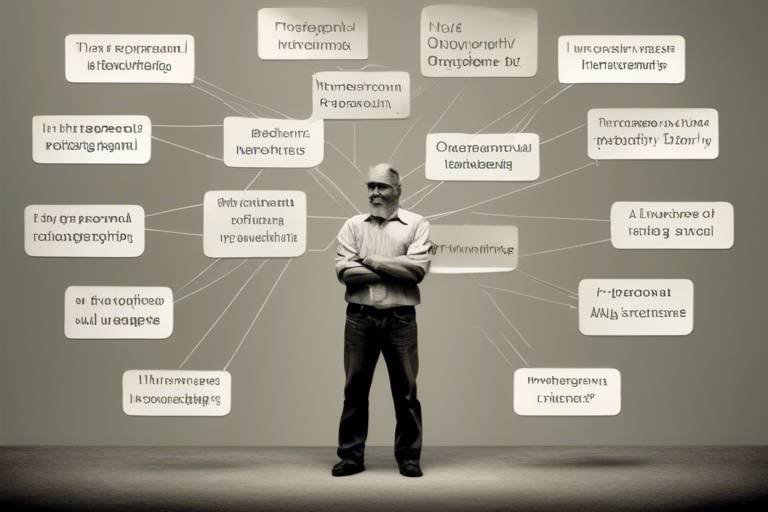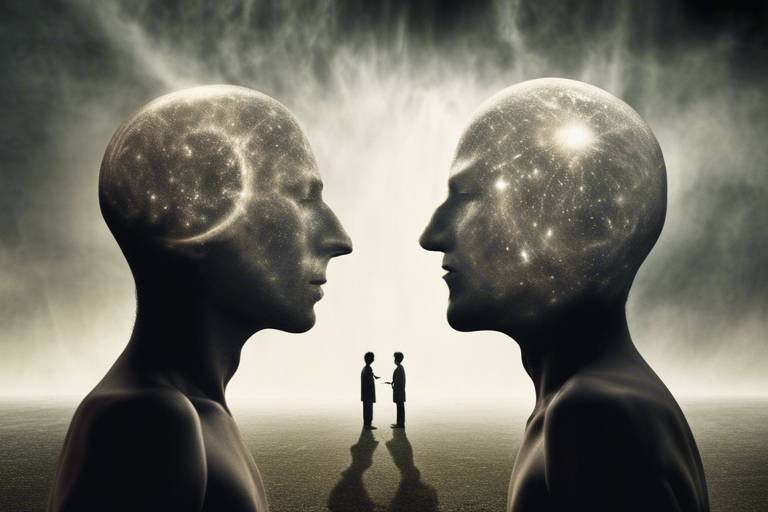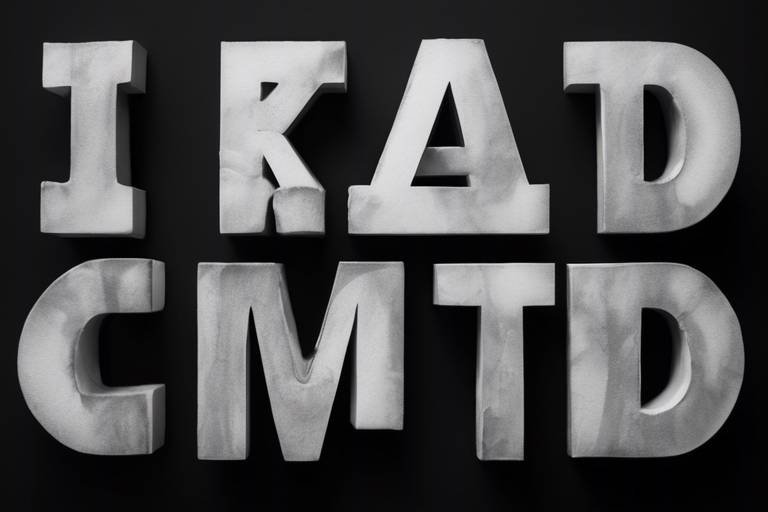The Relevance of Ontology in Interpersonal Relationships
In today's fast-paced world, the way we connect with one another is more important than ever. Interpersonal relationships are the bedrock of our social existence, influencing everything from our emotional well-being to our professional success. But have you ever stopped to consider how the very essence of being—what philosophers call ontology—shapes these relationships? Understanding ontology can reveal the underlying frameworks that dictate how we communicate, how we perceive ourselves and others, and how we navigate our connections in various contexts.
Ontology, at its core, is the study of being and existence. It delves into the nature of reality and what it means to exist. When applied to interpersonal relationships, ontology offers profound insights into the dynamics of communication and identity. By examining our ontological beliefs, we can better understand how they influence our interactions, shape our identities, and ultimately affect the quality of our relationships.
Consider this: every time we engage in a conversation, we’re not just sharing words; we’re expressing our beliefs about ourselves and the world around us. These beliefs are deeply rooted in our ontological understanding. For example, if you view relationships as purely transactional, that perspective will color how you interact with others. Conversely, if you see relationships as opportunities for deep connection, your communication will likely reflect that belief. This is where ontology becomes a powerful lens through which to view our interpersonal dynamics.
Moreover, the relevance of ontology extends beyond individual interactions. It encompasses broader social constructs that shape our relationships. Different cultures may hold distinct ontological beliefs, leading to diverse ways of relating to one another. Understanding these differences can pave the way for more harmonious interactions, whether in personal relationships or professional settings. By recognizing how our ontological frameworks influence our perceptions and behaviors, we can foster deeper connections and navigate conflicts with greater empathy.
In the sections that follow, we will explore various dimensions of ontology and its impact on interpersonal relationships. From communication styles influenced by ontological beliefs to the role of identity formation and cultural differences, we’ll uncover how a deeper understanding of ontology can enrich our relationships. So, let’s dive in and discover how this philosophical concept can transform the way we connect with one another!

Understanding Ontology
Ontology, at its core, is a profound philosophical inquiry into the nature of being and existence. Imagine it as the foundation of a grand building; without a solid base, the structure cannot stand tall. Similarly, ontology provides the essential framework upon which our understanding of relationships is constructed. It delves into questions such as: What does it mean to exist? How do we define ourselves and others? These inquiries are not merely academic; they resonate deeply within our interpersonal dynamics.
To grasp ontology's significance, we must first recognize its fundamental principles. At its heart, ontology explores the essence of entities—be they individuals, groups, or concepts. It encourages us to reflect on our perceptions and beliefs about existence, which, in turn, shape our interactions with others. For instance, consider how someone’s belief in the interconnectedness of all beings can influence their approach to relationships. This ontological perspective fosters empathy and understanding, enhancing the quality of interactions.
Moreover, ontology is not a static concept; it evolves with cultural, social, and personal contexts. Different ontological frameworks can lead to varied interpretations of reality, which is crucial in understanding interpersonal relationships. For example, in some cultures, individualism is prioritized, while in others, collectivism reigns supreme. These differing ontological views significantly impact how relationships are formed and maintained.
In essence, ontology encourages us to examine not just the 'what' of our relationships, but the 'why' behind them. It prompts us to ask questions like:
- What beliefs do I hold about myself and my place in the world?
- How do these beliefs influence my interactions with others?
- In what ways can understanding different ontological perspectives enhance my relationships?
By engaging with these questions, we can cultivate deeper connections and foster a more profound understanding of ourselves and those around us. Recognizing that our perceptions are shaped by our ontological beliefs allows us to navigate the complexities of interpersonal relationships with greater awareness and sensitivity.

Ontology and Communication
Effective communication is the lifeblood of any relationship, whether it's a friendship, a romantic partnership, or a professional connection. But have you ever stopped to think about how our understanding of being—our ontology—shapes the way we communicate? Ontology isn't just a philosophical concept confined to dusty books; it plays a crucial role in how we express ourselves and interact with others. By examining our ontological beliefs, we can uncover layers of meaning in our conversations, leading to deeper understanding and connection.
At its core, ontology influences the very frameworks through which we perceive the world and our place in it. When we communicate, we are not merely exchanging words; we are sharing our realities and perspectives. This is where the relationship between ontology and communication becomes particularly fascinating. Think about it: every time you engage in a dialogue, you're not just delivering information; you're also revealing your beliefs about existence, identity, and the nature of your relationship with the other person.
One of the most compelling aspects of this relationship is the role of language as an ontological expression. The words we choose, the phrases we use, and even the tone of our voice convey so much more than surface-level meaning. For instance, when someone describes an experience as "challenging," it might reflect their belief in growth through adversity. Conversely, labeling the same experience as "overwhelming" could indicate a different ontological stance, one that views challenges as burdens rather than opportunities. This subtle interplay of language and ontology can either bridge gaps in understanding or create barriers, depending on how well we recognize and navigate these differences.
Language serves as a mirror reflecting our ontological beliefs. It's fascinating to see how the words we choose can shape our perceptions of ourselves and others in relationships. When we communicate, we often inadvertently project our beliefs about existence and identity. For example, consider the difference between saying "I am a teacher" versus "I teach." The first statement implies a fixed identity, while the second emphasizes action and fluidity. This distinction can significantly impact how we relate to others and how they perceive us.
Metaphors are another powerful tool in the realm of communication, acting as bridges between our ontological beliefs and our interactions with others. They allow us to express complex ideas in relatable terms. For example, referring to a relationship as a "journey" implies growth, exploration, and potential for change, while describing it as a "battle" suggests conflict and struggle. These metaphors shape not only our understanding of relationships but also our expectations and behaviors within them. By recognizing the metaphors we use, we can gain insights into our own ontological perspectives and how they influence our interactions.
Let's not forget about the power of non-verbal communication, which plays a significant role in conveying ontological meanings. Body language, facial expressions, and even the space we occupy during conversations can express feelings and beliefs that words sometimes fail to capture. For instance, crossing one's arms might signal defensiveness or discomfort, while open body posture can indicate receptiveness and trust. Understanding these cues can enhance our communication and foster more authentic connections. It's essential to be aware of our own non-verbal signals and to interpret those of others accurately, as they often provide deeper insights into the underlying ontological beliefs at play.
In summary, the relationship between ontology and communication is intricate and profound. By recognizing how our beliefs about existence shape our interactions, we can become more effective communicators. This understanding not only enriches our personal relationships but also enhances our ability to navigate complex social dynamics. So, the next time you engage in a conversation, take a moment to reflect on the ontological undercurrents at play. You might just discover new depths of meaning and connection.
- What is ontology in simple terms?
Ontology is the philosophical study of being and existence, focusing on the nature of reality and how we understand it. - How does ontology affect communication?
Ontology influences the way we express ourselves, shaping our language, metaphors, and non-verbal cues, which all play a role in how we connect with others. - Can understanding ontology improve my relationships?
Yes! By recognizing the ontological beliefs that guide your interactions, you can enhance understanding, reduce misunderstandings, and foster deeper connections.

Language as Ontological Expression
Language is much more than just a tool for communication; it is a profound ontological expression that reveals how we perceive ourselves and others in the intricate web of interpersonal relationships. When we speak, we are not merely relaying facts; we are sharing our beliefs, identities, and worldviews. Each word we choose carries with it a weight of meaning shaped by our experiences, culture, and personal philosophy. For instance, consider how the term "friend" can evoke different images and expectations depending on one's ontological framework. To some, a friend is a lifelong companion, while to others, it may simply refer to an acquaintance. This divergence in understanding can lead to misunderstandings if not navigated with care.
Furthermore, language serves as a mirror reflecting our ontological beliefs. The way we construct sentences, use metaphors, and even our choice of adjectives can indicate our underlying assumptions about existence and relationships. For example, when someone describes a challenging situation as a "battle," it may suggest a combative worldview, whereas referring to it as a "journey" implies a more fluid and explorative perspective. These choices shape not only our self-perception but also how we relate to others, influencing the dynamics of our interactions.
Moreover, the subtleties of language can enrich our understanding of relational complexities. Consider the impact of non-verbal cues that accompany our spoken words. A simple nod or a smile can complement our verbal expressions, adding layers of meaning that speak to our ontological stance. This non-verbal communication is crucial; it often conveys what words cannot. For instance, saying "I'm fine" while crossing one's arms might suggest defensiveness, indicating that the speaker's ontological state is not as straightforward as their words imply.
To illustrate the relationship between language and ontology, let’s take a look at the following table that summarizes different ontological perspectives and their linguistic expressions:
| Ontological Perspective | Language Expression | Example Phrase |
|---|---|---|
| Realism | Descriptive, factual | "The sky is blue." |
| Constructivism | Interpretative, subjective | "The sky feels like a canvas of emotions." |
| Relational | Contextual, dynamic | "The sky changes with our moods." |
This table highlights how different ontological perspectives can shape the way we express ourselves linguistically. Each perspective not only influences our language but also our understanding of relationships. By recognizing these differences, we can enhance our communication skills, leading to more meaningful and authentic connections.
In conclusion, language is a powerful ontological expression that shapes our identities and relationships. By being mindful of the words we choose and understanding the underlying beliefs they convey, we can foster deeper connections and navigate the complexities of interpersonal dynamics with greater ease. So, the next time you engage in conversation, think about the ontological implications of your words—what do they reveal about you, and how might they be interpreted by others?
- What is ontology? Ontology is the philosophical study of being and existence, exploring the nature of reality and our understanding of it.
- How does language reflect our beliefs? Language reflects our beliefs through the choices we make in words, metaphors, and even non-verbal cues, revealing our perspectives on existence and relationships.
- Can understanding ontology improve communication? Yes, understanding ontology can enhance communication by helping individuals recognize differing worldviews, leading to clearer and more empathetic exchanges.

Metaphors and Meaning
When we think about communication, it’s fascinating how much we rely on metaphors to express our thoughts and feelings. Metaphors are not just decorative language; they are fundamental to how we understand and navigate our relationships. Imagine trying to explain a complex emotion like love or grief without using metaphors. It would be like trying to paint a beautiful landscape using only black and white. Metaphors add color and depth to our interactions, allowing us to convey feelings that might otherwise remain unspoken.
Consider the metaphor "life is a journey." This simple phrase transforms our understanding of existence from a mere sequence of events into a dynamic adventure filled with challenges, milestones, and opportunities for growth. When we use such metaphors, we frame our experiences in a way that resonates deeply with others, creating a shared understanding that can strengthen bonds. For instance, when someone says, "I hit a bump in the road," they’re not just talking about a literal pothole; they’re expressing a setback in their life, inviting empathy and support from those around them.
Moreover, metaphors can shape our perceptions of others in profound ways. For example, if we describe a friend as a "rock," we imply that they are a source of stability and support. This not only reflects our feelings towards them but also influences how we interact with them. We might lean on them more in times of need, reinforcing their role in our lives. In this way, metaphors become a lens through which we view our relationships, guiding our expectations and behaviors.
Additionally, metaphors can vary significantly across cultures, highlighting the importance of understanding different ontological perspectives. For example, in some cultures, the metaphor of "navigating a ship" might represent teamwork and collaboration, while in others, it could symbolize individual struggle against the waves of life. These differences can lead to misunderstandings if we are not aware of the underlying meanings that different metaphors carry.
To illustrate this point further, let’s look at a table that compares common metaphors used in different cultures:
| Cultural Context | Metaphor | Meaning |
|---|---|---|
| Western Culture | "Life is a journey" | Life is full of experiences and growth opportunities. |
| Eastern Culture | "Life is a river" | Life is fluid and ever-changing, requiring adaptability. |
| Indigenous Culture | "Life is a circle" | Life is interconnected and cyclical, emphasizing community and continuity. |
In conclusion, metaphors are not just linguistic flourishes; they are essential tools for making sense of our relationships and the world around us. They help us articulate our experiences, shape our identities, and foster connections with others. By being mindful of the metaphors we use and recognizing their power, we can enhance our communication and deepen our understanding of one another.
- What are metaphors? Metaphors are figures of speech that describe one thing in terms of another, helping to illustrate complex ideas and emotions.
- How do metaphors impact communication? Metaphors enhance understanding and emotional connection by framing experiences in relatable terms.
- Can metaphors differ across cultures? Yes, metaphors can vary widely between cultures, influencing how people perceive and interact in relationships.
- Why are metaphors important in relationships? They help articulate feelings, shape perceptions, and foster empathy, making communication more meaningful.

Non-verbal Communication
When we think about communication, we often focus on the words we say, but what about the messages we convey without uttering a single word? is a powerful tool in our interpersonal relationships, often speaking louder than words. It encompasses a variety of elements, including body language, facial expressions, gestures, and even the tone of our voice. These non-verbal cues can express emotions, attitudes, and intentions, often providing context that words alone cannot convey.
For instance, imagine you're in a conversation with a friend who seems distracted. While they might say, "I'm listening," their crossed arms and lack of eye contact might suggest otherwise. This discrepancy between verbal and non-verbal communication can lead to misunderstandings and conflict. Understanding these cues is essential for fostering healthy relationships. It's like reading between the lines; the real message often lies in what isn't said.
Moreover, non-verbal communication varies significantly across different cultures. What might be a friendly gesture in one culture could be considered offensive in another. For example, maintaining eye contact is often seen as a sign of confidence and engagement in many Western cultures, while in some Asian cultures, it may be viewed as disrespectful. This cultural nuance highlights the importance of being aware of non-verbal signals to avoid miscommunication.
To illustrate the impact of non-verbal communication, consider the following table that outlines different types of non-verbal cues and their potential meanings:
| Type of Non-verbal Cue | Meaning |
|---|---|
| Facial Expressions | Can convey a range of emotions, from happiness to anger. |
| Gestures | May indicate enthusiasm, agreement, or disagreement. |
| Posture | Reflects openness or defensiveness; can show confidence or insecurity. |
| Proximity | Indicates intimacy or aggression based on personal space preferences. |
| Touch | Can express affection, support, or dominance depending on context. |
In conclusion, non-verbal communication is a vital aspect of our interactions. It enhances our ability to connect with others and understand their feelings and intentions. By becoming more aware of our own non-verbal cues and those of others, we can improve our communication skills and build stronger, more meaningful relationships. So next time you're in a conversation, pay attention not just to the words, but also to the unspoken messages that accompany them. They might just hold the key to deeper understanding.
- What is non-verbal communication? Non-verbal communication refers to the transmission of messages or signals without the use of words. This includes body language, facial expressions, gestures, and tone of voice.
- Why is non-verbal communication important? It plays a crucial role in conveying emotions and intentions, often providing context that words alone cannot express. Understanding non-verbal cues can enhance interpersonal relationships.
- How can cultural differences affect non-verbal communication? Different cultures may interpret non-verbal cues in various ways. What is acceptable in one culture may be offensive in another, so it's important to be aware of these differences to avoid misunderstandings.
- Can non-verbal communication lead to misunderstandings? Yes, discrepancies between verbal and non-verbal communication can lead to confusion and conflict. Being aware of these cues can help mitigate potential issues.

Identity Formation through Ontology
Identity is not just a label we wear; it's a complex tapestry woven from our experiences, beliefs, and the very essence of our being. Ontology plays a pivotal role in this intricate process, shaping how we perceive ourselves and how we relate to others. When we talk about identity formation through ontology, we’re diving deep into the philosophical waters that define our existence. It's fascinating to consider how our understanding of what it means to 'be' influences not only our self-image but also the way we connect with those around us.
At its core, ontology helps us answer fundamental questions about existence: Who am I? What is my purpose? How do I fit into the world? These questions are not merely abstract; they resonate deeply within our daily interactions. For instance, consider how someone who identifies strongly with a particular cultural ontology may communicate differently than someone who does not. This is where identity and ontology converge, influencing everything from our personal beliefs to our social engagements.
Moreover, our ontological beliefs can lead to a sense of belonging or alienation. When individuals share similar ontological perspectives, they often form close-knit communities, reinforcing their identities through shared values and experiences. On the flip side, differing ontologies can create barriers, leading to misunderstandings and conflict. This dynamic illustrates how crucial it is to be aware of our own ontological frameworks and those of others, especially in today's diverse social landscape.
To illustrate this further, let’s consider a few key aspects of how ontology shapes identity:
- Self-Perception: Our beliefs about existence influence how we view ourselves. If we see ourselves as part of a greater whole, we may prioritize community and relationships. Conversely, a more individualistic ontology might lead to a focus on personal achievement.
- Social Roles: Ontology can dictate the roles we assume in society. For example, someone who believes in the interconnectedness of all beings may take on a nurturing role, while another who values independence might adopt a more competitive stance.
- Conflict Resolution: Understanding different ontological perspectives can aid in resolving conflicts, as it allows individuals to empathize with others' experiences and viewpoints.
In conclusion, the interplay between ontology and identity is a powerful force in shaping our interpersonal relationships. By understanding how our beliefs about existence inform our identities, we can foster deeper connections with others and navigate the complexities of social interactions more effectively. So, the next time you find yourself questioning your place in the world, remember that your ontological beliefs are not just abstract concepts; they are the very foundation of your identity and relationships.
Q1: How does ontology influence personal identity?
Ontology shapes our understanding of existence, which in turn influences how we perceive ourselves and our roles in society. It affects our beliefs, values, and ultimately, our identities.
Q2: Can different ontological beliefs lead to conflict in relationships?
Yes, differing ontological perspectives can create misunderstandings and conflicts. Recognizing and respecting these differences is crucial for effective communication and resolution.
Q3: How can understanding ontology improve communication?
By being aware of our own and others' ontological beliefs, we can enhance empathy and clarity in our interactions, leading to more meaningful connections.

Relationships and Social Constructs
When we think about relationships, it’s essential to recognize that they don't exist in a vacuum; they are deeply embedded within a web of social constructs. These constructs are the frameworks through which we perceive and engage with one another. They shape our expectations, behaviors, and even our emotions in various relational contexts. Have you ever wondered why certain norms dictate how we interact with friends, family, or even strangers? This is where the fascinating interplay between ontology and social constructs comes into play.
At the core of these constructs are the shared beliefs and values that society holds. For instance, in many cultures, there is a strong emphasis on familial bonds, which can dictate how individuals prioritize relationships. This can lead to a hierarchy of relationships, where family is placed above friends or acquaintances. Understanding these social constructs allows us to navigate our interactions more effectively. For example, consider the following social constructs that often influence our relationships:
- Gender Roles: Expectations based on gender can significantly impact how individuals relate to one another. Men and women might be socialized differently, leading to distinct communication styles and relationship dynamics.
- Cultural Norms: Different cultures have unique customs and traditions that shape interpersonal interactions. Understanding these can enhance our empathy and connection with others.
- Socioeconomic Status: The social class of individuals can influence their relationship dynamics, affecting everything from communication styles to expectations.
These constructs are not just arbitrary; they stem from ontological beliefs about what it means to be human and how we relate to one another. For example, if a society values independence and self-sufficiency, individuals may feel pressured to maintain a certain level of emotional distance in relationships. Conversely, a culture that emphasizes community and interdependence may foster closer, more intimate connections. It’s like the difference between a sturdy oak tree standing alone and a vibrant garden filled with interconnected plants. Each has its own beauty and function, but they thrive under different conditions.
Moreover, these constructs can evolve over time, influenced by various factors such as globalization and technological advancements. The rise of social media has transformed how we build and maintain relationships, often blurring the lines between online and offline interactions. This shift raises questions about the authenticity of connections and the role of ontology in these new relational landscapes. Are we truly connecting, or are we merely curating our identities for public consumption?
Understanding the relationship between ontology and social constructs is crucial for fostering healthier, more meaningful connections. By recognizing the frameworks that shape our interactions, we can become more aware of our biases and assumptions. This awareness allows us to challenge societal norms that may not serve us well and to engage with others in a more authentic and empathetic manner. In essence, it’s about peeling back the layers of our relationships to reveal the deeper truths that underpin them.
In conclusion, relationships are not merely personal; they are a reflection of the social constructs that surround us. By exploring these constructs through an ontological lens, we can gain valuable insights into our interactions, paving the way for deeper connections and understanding in an increasingly complex world.
- What are social constructs? Social constructs are ideas and norms that are created and accepted by society, shaping how individuals interact and perceive each other.
- How do social constructs influence relationships? They set expectations and norms that dictate behavior, communication styles, and the nature of connections between individuals.
- Can social constructs change over time? Yes, social constructs can evolve due to cultural shifts, technological advancements, and changing societal values.

Cultural Ontologies
Cultural ontologies are fascinating constructs that shape how we perceive and engage in interpersonal relationships. At their core, these ontologies reflect the collective beliefs, values, and practices of a particular culture, influencing our understanding of identity, communication, and social norms. For example, in some cultures, individualism is highly valued, leading to relationships that emphasize personal achievement and autonomy. In contrast, collectivist cultures prioritize community and familial ties, which can foster a sense of belonging but may also impose certain expectations on personal relationships.
When we delve deeper into cultural ontologies, we can see how they manifest in various ways. Language is a primary vehicle through which cultural ontologies are expressed. The words we choose, the metaphors we use, and even the silence we maintain can reveal a lot about our cultural background. For instance, in many Western cultures, direct communication is often preferred, whereas in Eastern cultures, indirect communication may be more common. This difference can lead to misunderstandings in interpersonal relationships if one party is not aware of the other's cultural context.
Moreover, cultural ontologies influence our understanding of concepts like love, friendship, and respect. In some cultures, love might be expressed through grand gestures and romantic declarations, while in others, it could be shown through acts of service and loyalty. This variation can lead to conflicts in relationships when partners have different expectations based on their cultural backgrounds. Understanding these differences is crucial for fostering healthier and more meaningful connections.
To illustrate the impact of cultural ontologies on relationships, consider the following table that outlines key differences between individualistic and collectivist cultures:
| Aspect | Individualistic Cultures | Collectivist Cultures |
|---|---|---|
| Focus | Self and personal goals | Group and community goals |
| Communication Style | Direct and explicit | Indirect and implicit |
| Conflict Resolution | Confrontational | Avoidant or mediated |
| Relationships | Emphasizes personal choice | Emphasizes family and community ties |
As we navigate through various cultural landscapes, it becomes increasingly important to recognize and respect these differences. Engaging with individuals from diverse backgrounds requires a willingness to learn and adapt, much like learning a new language. The more we immerse ourselves in understanding different cultural ontologies, the more enriched our interpersonal relationships become. This understanding can lead to deeper connections, greater empathy, and a more harmonious coexistence in our increasingly globalized world.
In conclusion, cultural ontologies not only shape our views on relationships but also guide our interactions and expectations. By embracing the diversity of these beliefs, we can cultivate relationships that are not only respectful but also deeply fulfilling. So, the next time you find yourself in a cross-cultural interaction, take a moment to consider the underlying ontological beliefs at play. It could make all the difference!
- What is cultural ontology? Cultural ontology refers to the collective beliefs and values of a culture that shape how individuals understand existence and relationships.
- How do cultural ontologies affect communication? They influence communication styles, leading to differences in directness, expression, and interpretation of messages.
- Why is understanding cultural ontologies important? It enhances empathy and fosters better relationships by helping individuals navigate differences in expectations and behaviors.

Ontology in Conflict Resolution
Conflict is an inevitable part of human interaction, and understanding the underlying ontological differences can be a game-changer in resolving disputes. When we approach conflicts with an awareness of the various ontological perspectives at play, we can unlock deeper levels of understanding that pave the way for resolution. Think of ontology as the lens through which we view ourselves and others; by recognizing that these perspectives differ, we can learn to navigate conflicts more effectively.
One of the key aspects of resolving conflicts through an ontological lens is the recognition of the **belief systems** that shape our perceptions. For instance, if two individuals are in disagreement, it’s often not just about the issue at hand but also about their fundamental beliefs regarding existence, identity, and value. This means that effective conflict resolution requires us to engage in dialogue that goes beyond surface-level disagreements. We must delve into the **ontological roots** of our beliefs to truly understand each other.
To illustrate this, consider a common workplace conflict where two team members disagree on the best approach to a project. Instead of merely arguing over methods, they could benefit from discussing their underlying beliefs about success and collaboration. One might see success as a collective achievement, while the other views it as an individual accomplishment. By acknowledging these differing ontologies, they can find common ground and work towards a solution that respects both perspectives.
Moreover, employing strategies that foster ontological understanding can significantly enhance conflict resolution efforts. Here are a few effective strategies:
- Active Listening: Truly listen to the other person's perspective without immediately formulating a response. This shows respect for their ontological beliefs.
- Ask Open-Ended Questions: Encourage dialogue by asking questions that invite deeper exploration of beliefs, such as, "What do you believe is the best way to approach this?"
- Reflect on Shared Values: Identify common values that both parties can agree upon, which can serve as a foundation for resolution.
In addition to these strategies, it’s also crucial to create an environment where individuals feel safe to express their ontological views. This might involve establishing ground rules for discussions or ensuring that all voices are heard. When individuals feel respected and understood, they are more likely to engage in constructive dialogue rather than defensively clinging to their positions.
Ultimately, resolving conflicts through an ontological lens not only addresses the immediate issues but also strengthens interpersonal relationships. By fostering an environment of understanding and respect, we can transform conflicts into opportunities for growth and deeper connection. Just like a gardener nurtures plants to help them flourish, so too can we nurture our relationships by acknowledging and valuing the diverse ontological perspectives that each person brings to the table.
- What is ontology in the context of relationships?
Ontology refers to the study of being and existence, shaping how individuals perceive themselves and others in interpersonal dynamics. - How can understanding ontology help in conflict resolution?
By recognizing the different ontological beliefs that influence perspectives, individuals can engage in deeper, more meaningful conversations that lead to effective resolutions. - What strategies can be used to resolve conflicts through an ontological perspective?
Active listening, asking open-ended questions, and reflecting on shared values are effective strategies to foster understanding and resolution.
Frequently Asked Questions
- What is ontology and why is it important in interpersonal relationships?
Ontology is the philosophical study of being and existence. In interpersonal relationships, it shapes how we perceive ourselves and others, influencing our communication and connections. Understanding ontology helps us grasp the underlying beliefs that drive our interactions.
- How does ontology affect communication between individuals?
Ontology plays a crucial role in communication by framing our understanding and interpretation of messages. It helps clarify intentions and meanings, allowing for more effective exchanges. When we recognize different ontological perspectives, we can enhance mutual understanding and reduce miscommunication.
- Can you explain the role of language as an ontological expression?
Language is more than just a tool for sharing information; it's a reflection of our ontological beliefs. The way we use language can reveal our perceptions of identity, relationships, and the world around us. By examining our language choices, we can better understand our own ontological views and how they influence our interactions.
- What is the significance of metaphors in understanding relationships?
Metaphors are powerful tools in communication that shape our understanding of relationships. They can convey complex ideas and emotions in relatable terms. By using ontological metaphors, we can express feelings and concepts that might otherwise be difficult to articulate, enriching our interpersonal connections.
- How do non-verbal cues convey ontological meanings?
Non-verbal communication, such as body language and gestures, plays a vital role in expressing ontological beliefs. These cues often communicate feelings and intentions that words alone may not capture. Being aware of non-verbal signals can enhance our understanding of others and improve our relational dynamics.
- In what ways does ontology influence identity formation?
Ontology significantly impacts how we form our identities and how we perceive others. Our beliefs about existence and being shape our self-concept and relational identities. By exploring these ontological beliefs, we can gain insights into our personal development and how we relate to others.
- How do cultural ontologies affect interpersonal relationships?
Cultural backgrounds provide distinct ontological frameworks that influence relational dynamics. Different cultures may have varying beliefs about existence, identity, and communication, which can lead to misunderstandings. Recognizing these differences is essential for fostering healthy and respectful relationships across cultures.
- What strategies can be used for conflict resolution through ontology?
Understanding ontological differences is key to resolving conflicts. By acknowledging and respecting each other's beliefs about existence, we can foster dialogue and find common ground. Strategies such as active listening and empathetic communication can help bridge gaps and promote harmony in relationships.



















